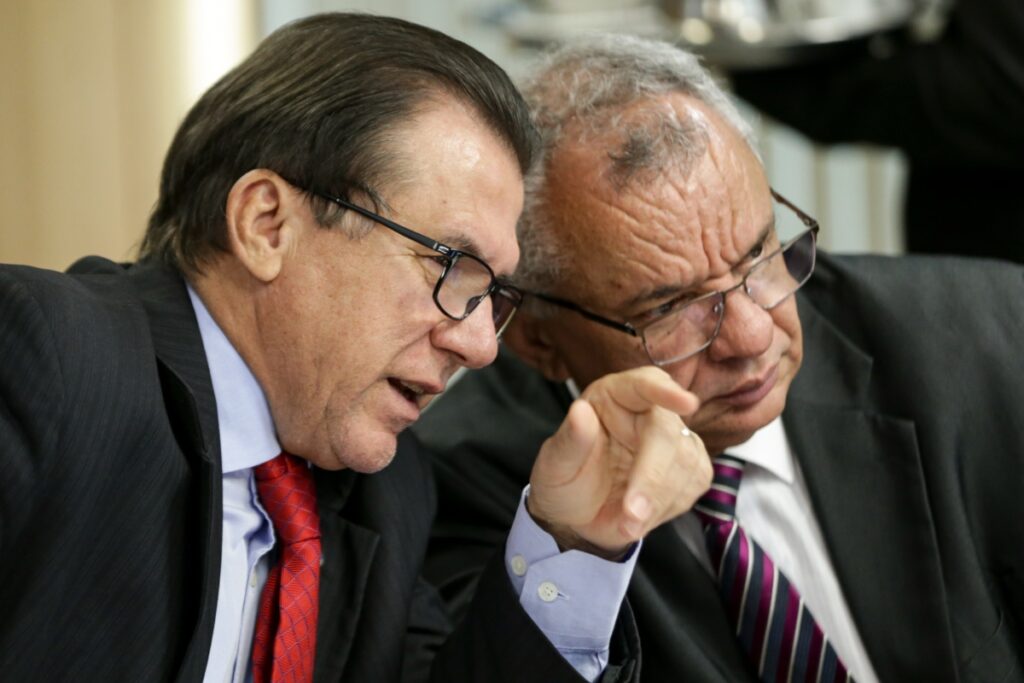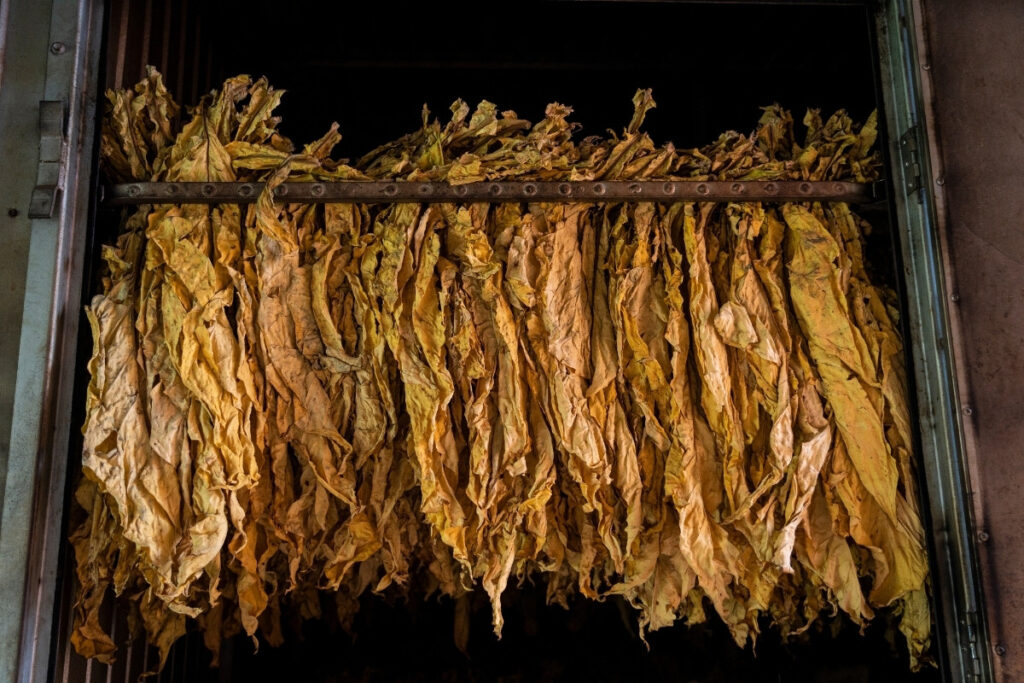SANTA COLOMBA Agropecuária, which requested direct intervention from the leadership of the Ministry of Labor and Employment (MTE) and succeeded in preventing its name from being added to Brazil’s Dirty List of slave labor offenders, supplies raw materials to agribusiness multinationals such as Syngenta Seeds and Philip Morris.
Producer of grains, seeds, cotton, cocoa, and tobacco in Bahia, in northeastern Brazil, the company was fined in November 2023 for subjecting a worker to conditions analogous to slavery. The fine was issued after an employee of Santa Colomba reported being tortured by security guards at Fazenda Karitel, one of the company’s production hubs.
According to the inspection report obtained by Repórter Brasil, the worker was handcuffed, locked in a dark room, and beaten by the guards. After inspecting the site and analyzing documents such as a police inquiry and medical reports, the MTE’s technical team fined the company for subjecting the worker to degrading conditions—one of the four criteria that define “conditions analogous to slavery” in Brazil.
Company avoids entry in the Dirty List
Under Brazilian law, once a company is found responsible for slave labor by the Labor Inspection Department, it is entitled to a full defense and appeal process in two administrative instances before the fine is confirmed and the employer’s name is entered in the Register of Employers who have subjected workers to conditions analogous to slavery, known as the Dirty List of slave labor.
On October 2, the acting Minister of Labor granted the company’s request and personally took over the authority to decide on Santa Colomba’s case. According to sources interviewed by Repórter Brasil, the move is seen as political interference in a technical process.
The appeal keeps the company off the Dirty List until the ministerial decision. The latest update to the list, published Monday (6), added 159 new names.

In September, Minister of Labor Luiz Marinho used the same procedure in the case involving JBS Aves—part of global meat giant JBS—which had been fined for slave-like conditions, as previously revealed by Repórter Brasil. Before that, no Labor Minister had ever invoked this power since the Dirty List was created in November 2003.
Exclusive contract with tobacco giant
Santa Colomba has maintained contracts with Philip Morris—owner of Marlboro and L&M cigarette brands—since at least 2021, according to financial statements obtained by Repórter Brasil. In 2023, an exclusive contract with Philip Morris accounted for nearly half (49%) of the company’s total revenue.
This contract also served as collateral for an Agribusiness Receivables Certificate (CRA) issued by Santa Colomba in 2019. In this mechanism, the company issues securities backed by its receivables, allowing investors to advance payments to the firm. In this case, a “Contract for the Planting, Harvesting, Curing, Purchase and Sale of Tobacco and Other Agreements” between Santa Colomba and Philip Morris was used as the guarantee, according to financial documents accessed by Repórter Brasil.
In October 2024, Repórter Brasil had already reported on this relationship after Bahia’s environmental agency identified a kind of “animal cemetery” at Fazenda Karitel. The property was fined for failing to protect irrigation channels and for endangering fauna in the nearby Grande Sertão Veredas Park, a Cerrado biome sanctuary.
Among Philip Morris’s social and environmental policies are commitments to mitigate risks of labor exploitation in its supply chains and to exclude suppliers listed in the Dirty List.
In a statement sent to Repórter Brasil on Wednesday (8), Santa Colomba said it is following the MTE administrative process and that “decisions by the Labor Prosecution Office and the Labor Court, as well as conclusions from the Civil Police investigation, prove that the case does not involve practices of slavery-like labor.” The company reaffirmed its “absolute commitment to human rights, sustainability, and social responsibility” and described the incident as an “isolated occurrence involving a third-party contractor and a worker.” It declined to comment on its commercial relationships.
Philip Morris did not respond by the time of publication.
Seeds for Syngenta
Santa Colomba also dedicates farmland to the multiplication of corn and soybean seeds for Syngenta Seeds and Boa Safra, two leading seed producers in Brazil and worldwide. Once grown, these seeds are distributed to the companies’ clients.
The commercial partnerships with Syngenta and Boa Safra have existed since at least 2021, according to Santa Colomba’s financial statements.
Headquartered in Switzerland, Syngenta states in its Supplier Code of Conduct that its business partners must “ensure that they do not participate directly or indirectly, or benefit in any way, from forced or slave labor,” including through “physical or mental coercion.”
However, when contacted by Repórter Brasil, Syngenta said that being listed in the Dirty List is its main criterion for excluding suppliers. The company stated it was unaware of the fine against Santa Colomba since it has not yet been added to the list, and that the “case is being duly monitored so we can act according to its developments.” Syngenta added that it “will not accept any supplier listed in the Ministry of Labor’s Dirty List.” Read Syngenta’s full answer.
Boa Safra Sementes—operating processing and distribution centers in eight Brazilian states—states in its Code of Ethics that it “repudiates slave-like or degrading labor, child labor, unfair competition, and any other practices contrary to the principles of this Code throughout its value chain.”
Contacted by Repórter Brasil, Boa Safra said it was unaware of the situation and that it “condemns any disregard for life and does not condone situations outside ethical and legal labor standards.” The company did not clarify whether it would take concrete action regarding Santa Colomba.
Swiss chocolate manufacturer Barry Callebaut—one of the world’s largest—had reportedly begun negotiations for a partnership with Santa Colomba, according to an April report by Reuters. The multinational did not confirm the deal at the time and has not commented now.
Companies must take responsibility for their supply chains, expert says
“When companies adopt due diligence measures, they become agents in the fight against inequality,” says Ravenna Alves, coordinator for Rural Justice and Development at Oxfam Brazil. “Due diligence” refers to the process of identifying, preventing, mitigating, and addressing potential negative impacts a company may cause or contribute to. “When multinationals fail to ensure traceability and transparency in their supply chains, inequality increases.”
In Brazil, the absence of a regulatory framework for corporate due diligence makes this process difficult, Alves adds. “Once you know your suppliers, you can compel them to act responsibly—to comply with labor and environmental laws and social standards,” she says.
What the Ministry of Labor says
In a note sent to Repórter Brasil on Wednesday (8) about Santa Colomba’s case, the MTE stated that “the minister avocated the process at the company’s request,” in accordance with labor legislation, and that “the company claims its appeals were not considered and points to inconsistencies in the infraction notice.”The Ministry also said that “avocation is a legally established instrument, neither unprecedented nor exclusive, and does not depend on the size of the company. It consists of the competent authority’s analysis of administrative acts under its responsibility, with the legal prerogative to review them.” The ministry’s full statement can be read here.
Leia também



